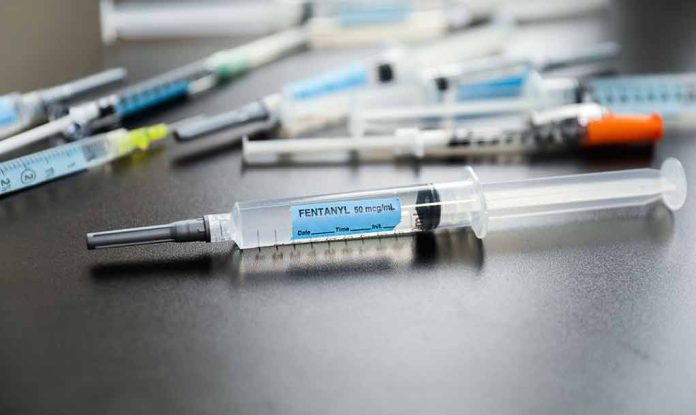
The Trump Administration strangles Mexican banks, fueling America’s deadly fentanyl crisis, cutting off the money pipeline between cartels and Chinese chemical suppliers.
Key Takeaways
- The Treasury Department has sanctioned three Mexican banks—CIBanco, Intercam, and Vector—as primary money laundering concerns for drug cartels trafficking fentanyl.
- These financial institutions facilitated millions in payments between Mexican cartels and Chinese suppliers of fentanyl precursor chemicals.
- The sanctions mark the first use of the Fentanyl Sanctions Act and FEND Off Fentanyl Act, demonstrating the Trump Administration’s aggressive approach to combating the opioid crisis.
- Fentanyl trafficking at the southern border reportedly dropped by half following President Trump’s enhanced immigration enforcement measures.
- The Department of Homeland Security has seized enough fentanyl at the southern border to potentially kill 14 billion people.
Treasury Department Cracks Down on Mexican Banking System
The U.S. Department of the Treasury’s Financial Crimes Enforcement Network (FinCEN) has issued groundbreaking orders against three Mexico-based financial institutions identified as primary money laundering vehicles for deadly fentanyl trafficking operations. CIBanco, Intercam, and Vector have been targeted in this unprecedented action, the first under the Fentanyl Sanctions Act and the FEND Off Fentanyl Act. These decisive measures prohibit American financial institutions from conducting fund transfers involving these Mexican banks, effectively cutting off critical money flows supporting drug cartels’ operations.
“Financial facilitators like CIBanco, Intercam, and Vector are enabling the poisoning of countless Americans by moving money on behalf of cartels, making them vital cogs in the fentanyl supply chain,” Secretary of the Treasury Scott Bessent.
Treasury investigations revealed these banks have been laundering millions of dollars for notorious Mexican cartels, including the Beltran-Leyva Cartel, Jalisco New Generation Cartel (CJNG), and Gulf Cartel. More alarmingly, they processed payments from Mexico to China for precursor chemicals essential to fentanyl production. The restrictions go into effect 21 days after publication in the Federal Register, giving American banks a limited time to sever ties with these compromised institutions. None of the three Mexican banks has provided comments on these sanctions.
Breaking the Fentanyl Supply Chain
The Trump Administration’s actions against these financial institutions represent a strategic attack on the fentanyl supply chain’s economic foundation. By designating several cartels as Foreign Terrorist Organizations (FTOs) and Specially Designated Global Terrorists (SDGTs), President Trump has enabled broader enforcement powers across multiple federal agencies. This coordinated approach targets not just the drugs and criminals, but the financial infrastructure that keeps the deadly trade operational. Early results show promising signs, with fentanyl trafficking reportedly reduced by half at the southern border.
The scale of the fentanyl crisis cannot be overstated. Department of Homeland Security officials report seizing enough of the synthetic opioid at the southern border to potentially kill 14 billion people—more than enough to wipe out the entire human population. Each of the sanctioned banks played specific roles in this deadly trade. CIBanco laundered money for multiple cartels while facilitating chemical procurement from China. Intercam processed funds specifically for CJNG operations, while Vector served both the Sinaloa and Gulf Cartels’ financial needs.
Bipartisan Support for Aggressive Action
The Treasury Department’s sanctions have garnered support from both sides of the political aisle, reflecting the devastating nationwide impact of fentanyl. Tens of thousands of American families lose loved ones annually to fentanyl overdoses, creating rare common ground for political action. The enforcement measures implemented represent the culmination of bipartisan legislation specifically designed to combat fentanyl trafficking through financial channels, with Republican leadership backing President Trump’s decisive implementation of these tools.
“Treasury’s action today – thanks to the authorities provided by our bill – is yet another demonstration of President Trump’s commitment to keeping our communities safe,” Republican Senate Banking Committee Chairman Tim Scott.
These sanctions are part of a broader U.S.-Mexico collaboration to combat transnational illicit finance threats from drug cartels. The Treasury Department’s approach recognizes that simply targeting street-level dealers or individual smugglers is insufficient—the fight against fentanyl requires dismantling the sophisticated financial networks that enable industrial-scale production and distribution. By striking at the banking infrastructure, President Trump has targeted a vulnerability that previous administrations failed to adequately address.



